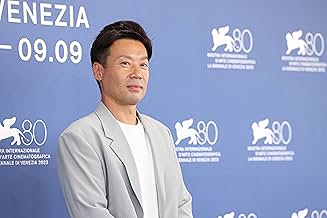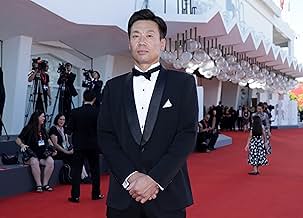PUNTUACIÓN EN IMDb
7,0/10
12 mil
TU PUNTUACIÓN
Takumi y su hija Hana viven en Mizubiki, cerca de Tokio. Un día, los habitantes del pueblo se enteran de un plan para construir un glamping cerca de la casa de Takumi que ofrezca una cómoda ... Leer todoTakumi y su hija Hana viven en Mizubiki, cerca de Tokio. Un día, los habitantes del pueblo se enteran de un plan para construir un glamping cerca de la casa de Takumi que ofrezca una cómoda "escapada" a la naturaleza.Takumi y su hija Hana viven en Mizubiki, cerca de Tokio. Un día, los habitantes del pueblo se enteran de un plan para construir un glamping cerca de la casa de Takumi que ofrezca una cómoda "escapada" a la naturaleza.
- Dirección
- Guión
- Reparto principal
- Premios
- 17 premios y 45 nominaciones en total
Reseñas destacadas
A local benri-ya-san (handyman), a single father in a provincial town near Tokyo, gets involved with big city interlopers looking to see up an ill-conceived glamping project in the area.
I am not a fan of slow cinema or the long take, and feared the worst when this film opened on Takumi taking an age to chop firewood, then taking an age to gather water from a stream. But as the film stuck to its pace and Takumi gives daughter Hana a piggy-back through the forest, pointing out species of trees and wildlife tracks, I was drawn into the rhythm of Takumi's day-to-day existence. A discordant note arrived jarringly, as the haunting soundtrack abruptly cut out on the edit. As a device to create a sense of foreboding it could have been heavy-handed, but here it is a bold choice that sits in counterpoint with the natural beauty on display.
The story plays out the theme imbibed in the title resolutely. Takumi is no Crocodile Dundee; he knows nature and has an even temperament, but his forgetfulness leads him to forgetting to pick up his daughter once too often. And even at home, he obsesses over drawing when his daughter craves attention. His deceased wife is never mentioned, but her presence-through-absence hangs over every scene of family life.
The big city interlopers as first appear like pantomime villains. But then another side to them, too, is revealed. Takahashi comes across as a pompous fool in the village meeting, but there is a sincerity to his attempts to live a meaningful life, and we believe him when he talks during a long drive about wanting to dedicate his life to making his partner happy. His subordinate Mayuzumi at first appears to be the voice of pragmatism and common sense. But during the same drive we hear that she left a job as a carer to work in TV, a world she is fully aware is full of "lowlifes." She, too, has a shallow side. No one in this world is without shadows. When these three characters are thrown together in the film's last act, it is impossible to fathom where events will lead.
Where they do lead is to a point that audiences will either love or hate. Perhaps conditioned by the bum-numbing running time of Hamaguchi's previous film, Drive My Car, I for a fleeting moment thought the real action of the film was just beginning, when it suddenly ended. In a film full of jarring moments, this was the most impactful. Some might say egregious.
The performances Hamaguchi draws from his cast are flawless. I was stunned to read that Hitoshi Omika was an AD before this. His magnetism is simply off the scale. Ryûji Kosaka captures a certain kind of frail but annoying masculinity to a tee. Ayaka Shibutani shines in an understated but pitch perfect outing.
Evil Does Not Exist throws up a more questions than answers. It is an intriguing film, frustrating even, but Hamaguchi makes bold choices here and displays a confidence and maturity that is admirable. Three days after going to the cinema, I am still thinking about this film, still actually wondering if I liked it. Some are calling it a masterpiece, but I'm not so sure. It is though, without a doubt, well worth seeing.
I am not a fan of slow cinema or the long take, and feared the worst when this film opened on Takumi taking an age to chop firewood, then taking an age to gather water from a stream. But as the film stuck to its pace and Takumi gives daughter Hana a piggy-back through the forest, pointing out species of trees and wildlife tracks, I was drawn into the rhythm of Takumi's day-to-day existence. A discordant note arrived jarringly, as the haunting soundtrack abruptly cut out on the edit. As a device to create a sense of foreboding it could have been heavy-handed, but here it is a bold choice that sits in counterpoint with the natural beauty on display.
The story plays out the theme imbibed in the title resolutely. Takumi is no Crocodile Dundee; he knows nature and has an even temperament, but his forgetfulness leads him to forgetting to pick up his daughter once too often. And even at home, he obsesses over drawing when his daughter craves attention. His deceased wife is never mentioned, but her presence-through-absence hangs over every scene of family life.
The big city interlopers as first appear like pantomime villains. But then another side to them, too, is revealed. Takahashi comes across as a pompous fool in the village meeting, but there is a sincerity to his attempts to live a meaningful life, and we believe him when he talks during a long drive about wanting to dedicate his life to making his partner happy. His subordinate Mayuzumi at first appears to be the voice of pragmatism and common sense. But during the same drive we hear that she left a job as a carer to work in TV, a world she is fully aware is full of "lowlifes." She, too, has a shallow side. No one in this world is without shadows. When these three characters are thrown together in the film's last act, it is impossible to fathom where events will lead.
Where they do lead is to a point that audiences will either love or hate. Perhaps conditioned by the bum-numbing running time of Hamaguchi's previous film, Drive My Car, I for a fleeting moment thought the real action of the film was just beginning, when it suddenly ended. In a film full of jarring moments, this was the most impactful. Some might say egregious.
The performances Hamaguchi draws from his cast are flawless. I was stunned to read that Hitoshi Omika was an AD before this. His magnetism is simply off the scale. Ryûji Kosaka captures a certain kind of frail but annoying masculinity to a tee. Ayaka Shibutani shines in an understated but pitch perfect outing.
Evil Does Not Exist throws up a more questions than answers. It is an intriguing film, frustrating even, but Hamaguchi makes bold choices here and displays a confidence and maturity that is admirable. Three days after going to the cinema, I am still thinking about this film, still actually wondering if I liked it. Some are calling it a masterpiece, but I'm not so sure. It is though, without a doubt, well worth seeing.
Ryûsuke Hamaguchi's Evil Does Not Exist is a very slow burn of a film, a character study disguised as an eco-drama. Nestled in the serene Mizubiki Village, a community thrives on a deep connection to nature. Their tranquility is shattered by the arrival of slick Tokyo suits proposing a glamping resort-a luxurious "escape" to nature for city dwellers. What follows is a clash of values, a meditation on the complexities of progress, and the blurry line between good and evil.
Hamaguchi doesn't hit us over the head with environmental messages. Instead, he lets the beauty of the Japanese countryside speak for itself. Lush forests and tranquil rivers become characters, a stark contrast to the sterile, neon-lit world the city reps represent. This visual poetry is amplified by the film's score, a melancholic blend of strings and woodwinds that perfectly captures the tension between tradition and modernity.
The acting is understated, mirroring the film's pacing. Hitoshi Omika, as Takumi, the gruff but conflicted villager, delivers a nuanced performance. We see his internal struggle-the fear of change wrestling with the desire to protect his way of life. The Tokyo reps, played by Ryô Nishikawa and Ryûji Kosaka, are initially portrayed as villains, all smiles and empty promises. However, as the film progresses, their own vulnerabilities peek through, reminding us that there's rarely a clear-cut bad guy in real life.
The plot of Evil Does Not Exist unfolds deliberately, sometimes feeling glacial. There are long stretches of dialogue that, while beautifully written, could test the patience of viewers expecting a more action-oriented film. The ending, too, occurs at a point where there is no resolution to the story, leaving us to scratch our heads wondering what might happen rather than being told. But there is a reason for this. By ending the movie (but not the story) in this way, Hamaguchi forces us to confront our own perspectives on the story, a tactic that might backfire for those seeking easy answers. There aren't any.
This won't be a film for everyone. Forget it if you want a fast-paced thriller. You will be disappointed. However, if you appreciate slow cinema and nuanced character studies, Evil Does Not Exist offers a rewarding experience. While the untranslated credits rolled, I just sat there, reflecting on our relationship with nature, the allure of progress, and the shades of grey that exist between good and evil. If you enjoyed contemplative films like Burning or Drive My Car (I enjoyed Evil Does Not Exist more), Evil Does Not Exist is definitely worth a watch. Just be prepared for a slow burn and an ending that will leave you pondering.
Hamaguchi doesn't hit us over the head with environmental messages. Instead, he lets the beauty of the Japanese countryside speak for itself. Lush forests and tranquil rivers become characters, a stark contrast to the sterile, neon-lit world the city reps represent. This visual poetry is amplified by the film's score, a melancholic blend of strings and woodwinds that perfectly captures the tension between tradition and modernity.
The acting is understated, mirroring the film's pacing. Hitoshi Omika, as Takumi, the gruff but conflicted villager, delivers a nuanced performance. We see his internal struggle-the fear of change wrestling with the desire to protect his way of life. The Tokyo reps, played by Ryô Nishikawa and Ryûji Kosaka, are initially portrayed as villains, all smiles and empty promises. However, as the film progresses, their own vulnerabilities peek through, reminding us that there's rarely a clear-cut bad guy in real life.
The plot of Evil Does Not Exist unfolds deliberately, sometimes feeling glacial. There are long stretches of dialogue that, while beautifully written, could test the patience of viewers expecting a more action-oriented film. The ending, too, occurs at a point where there is no resolution to the story, leaving us to scratch our heads wondering what might happen rather than being told. But there is a reason for this. By ending the movie (but not the story) in this way, Hamaguchi forces us to confront our own perspectives on the story, a tactic that might backfire for those seeking easy answers. There aren't any.
This won't be a film for everyone. Forget it if you want a fast-paced thriller. You will be disappointed. However, if you appreciate slow cinema and nuanced character studies, Evil Does Not Exist offers a rewarding experience. While the untranslated credits rolled, I just sat there, reflecting on our relationship with nature, the allure of progress, and the shades of grey that exist between good and evil. If you enjoyed contemplative films like Burning or Drive My Car (I enjoyed Evil Does Not Exist more), Evil Does Not Exist is definitely worth a watch. Just be prepared for a slow burn and an ending that will leave you pondering.
This film was supposed to be a 30 minute cinematic accompaniment to a score that the director's friend made, only that during the collection of video material Hamaguchi had this story idea and made a full feature film instead. The story starts off intriguing: a small Japanese community in the mountains is slightly challenged by the arrival of a company that wants to build a camping resort in their area without any knowledge of or interest in local issues or the damage they would do. There is even a long town hall discussion between the company representatives and the townsfolk which was truly inspiring. I mean, I can't imagine a European or American community reacting in such a measured, well mannered, well thought out and informed manner.
But this is where the movie veers into the absurd. People make life changing decisions in seconds, without being challenged by the ones around them - kind of like Hamaguchi's decision to finish the film the way he did, musical score and nature scenes take the place of plot and then it's one of those WTF endings. Presumably, the author wanted us to make our own mind about what the movie is about. Well, director-sama, that's the same thing as having nothing in particular to say.
The cinematography was good, the music excellent, the interactions between people natural, authentic, deep. The story was absolute rubbish.
Bottom line: in the end, a short cinematic companion to a music score became a very long and obtuse cinematic companion to a music score. Top marks for the music!
But this is where the movie veers into the absurd. People make life changing decisions in seconds, without being challenged by the ones around them - kind of like Hamaguchi's decision to finish the film the way he did, musical score and nature scenes take the place of plot and then it's one of those WTF endings. Presumably, the author wanted us to make our own mind about what the movie is about. Well, director-sama, that's the same thing as having nothing in particular to say.
The cinematography was good, the music excellent, the interactions between people natural, authentic, deep. The story was absolute rubbish.
Bottom line: in the end, a short cinematic companion to a music score became a very long and obtuse cinematic companion to a music score. Top marks for the music!
Ryusuke Hamaguchi has made some interesting movies in his career like Drive My Car, Happy Hour, and Asako I & II. While I haven't been wowed by his works, I appreciate many aspects of his style and approach.
Throughout, this movie has some wonderful colorful productions, camerawork, sound designs and atmosphere which helped add layers of the nature landscapes and environment. The narrative provides some interesting themes of nature, conflict of interest, humans and humans vs. Nature issues and explores some interesting aspects that are strong. The performances are all pretty good as well.
However, I am a bit underwhelmed with certain aspects as I found some of the themes feeling a little uneven to work Hamaguchi is wanting to express. Especially when it comes to the characters as while I did found some of the characters interesting, I didn't feel too emotionally connected with their personalities and purpose which made it a bit difficult to fully invest at times.
The soundtrack is wonderful and the dialogue is solid. The film does suffer some pacing issues and with an ending that leaves to many interpretations which may be frustrating for some. Overall, despite it's flaws, it's mediative and nature experience made this movie pretty good.
Throughout, this movie has some wonderful colorful productions, camerawork, sound designs and atmosphere which helped add layers of the nature landscapes and environment. The narrative provides some interesting themes of nature, conflict of interest, humans and humans vs. Nature issues and explores some interesting aspects that are strong. The performances are all pretty good as well.
However, I am a bit underwhelmed with certain aspects as I found some of the themes feeling a little uneven to work Hamaguchi is wanting to express. Especially when it comes to the characters as while I did found some of the characters interesting, I didn't feel too emotionally connected with their personalities and purpose which made it a bit difficult to fully invest at times.
The soundtrack is wonderful and the dialogue is solid. The film does suffer some pacing issues and with an ending that leaves to many interpretations which may be frustrating for some. Overall, despite it's flaws, it's mediative and nature experience made this movie pretty good.
It's funny to see people who no doubt gushed over "Perfect Days" dismiss "Evil Does Not Exist" as "boring" and "obscure". Like PD, it begins by following a man's quotidian routine: chopping wood, drawing water, identifying wild plants, teaching his daughter the names of trees. Perhaps the fact that he lives in a mountain town of no architectural or historical significance is what turns them off, but I found Takumi's activities as riveting as those of PD's public toilet cleaner.
As in "Drive My Car", we're exposed to a Japan that a few visitors--including many Japanese--have seen. As someone who was raised in Japan and returns regularly, I was thrilled to see a mountain location like the places I visited last year. I also found the plot--the incursion of a glamping company on the town's pristine land--riveting. What began as a fight-the-power, urban-rural plot turned out completely differently from the norm, a surprise I'm still thinking about days later.
As in "Drive My Car", we're exposed to a Japan that a few visitors--including many Japanese--have seen. As someone who was raised in Japan and returns regularly, I was thrilled to see a mountain location like the places I visited last year. I also found the plot--the incursion of a glamping company on the town's pristine land--riveting. What began as a fight-the-power, urban-rural plot turned out completely differently from the norm, a surprise I'm still thinking about days later.
¿Sabías que...?
- CuriosidadesIn an interview with "The Los Angeles Times" published on May, 2, 2024, director Ryûsuke Hamaguchi decided to cast Hitoshi Omika as the lead role after Omika spent much time driving Hamaguchi around to rural locations in Japan to pick out locations to film for the director's concert film "Gift". This somewhat mirrored the plot of Hamaguchi's "Drive My Car".
- Banda sonoraFether
composed by Eiko Ishibashi
Selecciones populares
Inicia sesión para calificar y añadir a tu lista para recibir recomendaciones personalizadas
- How long is Evil Does Not Exist?Con tecnología de Alexa
Detalles
Taquilla
- Recaudación en Estados Unidos y Canadá
- 831.685 US$
- Fin de semana de estreno en EE. UU. y Canadá
- 42.752 US$
- 5 may 2024
- Recaudación en todo el mundo
- 3.261.306 US$
- Duración
- 1h 46min(106 min)
- Color
- Mezcla de sonido
- Relación de aspecto
- 1.66 : 1
Contribuir a esta página
Sugerir un cambio o añadir el contenido que falta

























